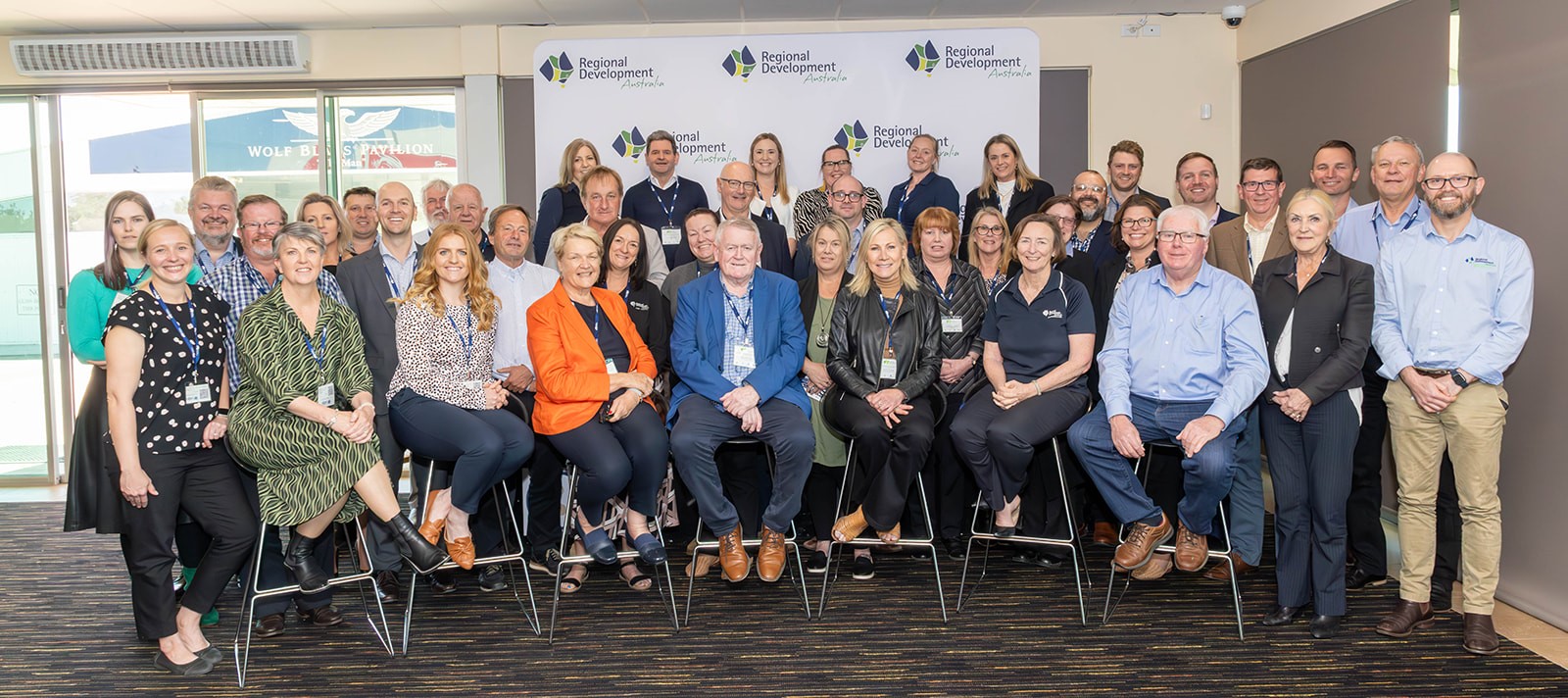
Population and Prosperity
Regional Population Growth for South Australia – making it happen
The RDSA 2023 Annual Summit provided an opportunity for federal, state and local government, industry and business to better discuss the opportunities and challenges surrounding population growth in our regions to generate ongoing prosperity
Hosted by RDA Adelaide and RDA Barossa Gawler Light Adelaide Plains at The Terrace Function Centre, Evanston, more than 160 RDA staff, key stakeholders and local representatives attended the RDSA Summit to dive into this year’s theme of Population and Prosperity.
The day, emceed by Channel 7’s Mike Smithson, began with a Welcome to Country by Kaurna Elder, Garth Aegis, who highlighted the significance of Kaurna land and their cultural practices, and the preservation of indigenous culture.

Welcome to Gawler and Introduce Minister
Mayor Karen Redman – Town of Gawler
Mayor Redman delved into Gawler’s historical significance and how it has shaped the town today, citing high quality of life, excellent transport links to Adelaide and the northern region, and a welcoming community.
The population of this regional hub has grown around 41% since the turn of the century to serve some 120,000 people, with an additional 40% growth anticipated over the next 15 years. With this in mind, Mayor Redman highlighted the importance of sustainable growth that respects cultural and built heritage, while positively contributing to the town’s identity.
Gawler’s growth management strategy relies on local government playing a central role in understanding and managing the community’s needs, including considerations for transport networks, encompassing roads, walking, and cycling, and a strong focus on maintaining social cohesion amid anticipated rapid growth.
Welcome Message
Minister Kristy McBain MP – Minister for Regional Development, Local Government & Territories
Joining via video link, Minister McBain emphasised the importance of community-driven decision-making that includes all voices, acknowledging the upcoming referendum on “The Voice.” She highlighted the need to tailor policies to regional communities, discussed challenges faced by Aboriginal and Torres Strait Islander people, and underscored the significance of population growth and prosperity in South Australia.
The government’s commitment to regional development was outlined, with a number of significant financial investments mentioned, including:
- The $10 billion Housing Australia Future Fund that is expected to create 30,000 social and affordable homes, comprising 20,000 social homes, 10,000 affordable homes for key workers, and 4,000 homes for those fleeing family violence or at risk of homelessness over the next 5 years.
- $7.4 billion of infrastructure investment for major road and rail projects over the next decade to improve freight movement and commuter safety across South Australia.
- Improved digital connectivity in regional areas, including co-contributions for 86 new mobile base stations and an expansion of full-fiber NBN to more than 660,000 premises in regional Australia
- Free NBN service for up to 30,000 unconnected families with school-aged children for up to 12 months, to address digital divide issues, particularly for remote learning.
The Minister acknowledged the importance of collaboration between RDAs and local governments in advocating for regional communities, as well as the significance of flexible policies tailored to the unique needs of regional Australia.
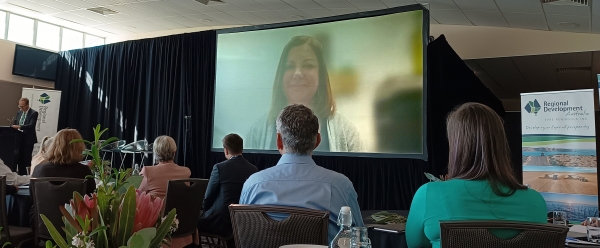
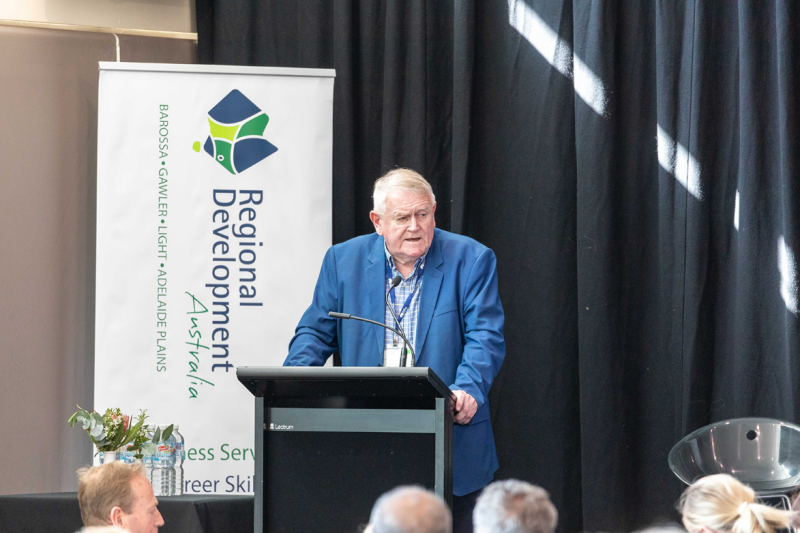
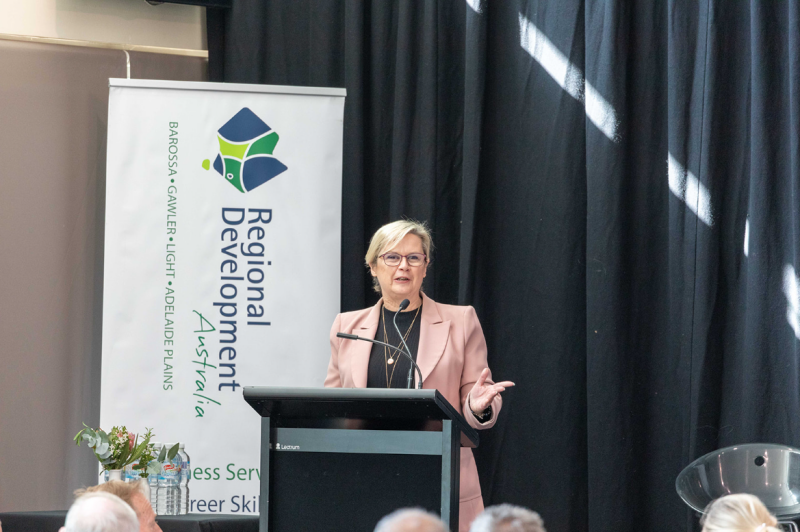
Ministerial Welcome
Hon. Rob Kerin – Executive Chair of RDSA
RDSA Chair, Rob Kerin, highlighted the significance of the tripartite relationship involving RDAs (Regional Development Australia), local governments, and government ministers. He acknowledged the presence of 24 local government partners and mayors in the room and their commitment to achieving positive outcomes in regional development, before welcoming the Minister to open the Summit.
Opening Address and Welcome
Hon. Clare Scriven MLC, Minister for Primary Industries and Regional Development Minister for Forest Industries
Minister Scriven provided the official opening address for the 2023 Regional Development South Australia Annual Summit, reiterating the importance of fostering a sense of belonging in regional communities to attract and retain residents.
She underscored the relevance state’s Economic Statement and its 3 key focuses of: capitalising the global green transition, being a partner of choice in an insecure world, and building South Australia’s talent, while acknowledging existing challenges, including job-worker mismatches and education gaps, emphasizing the role of collaboration among government entities, RDAs, stakeholders, and businesses.
I’ve been really pleased to work closer with RDAs so that government priorities and RDA priorities are absolutely talking to each other.
Hon. Clare Scriven MLC
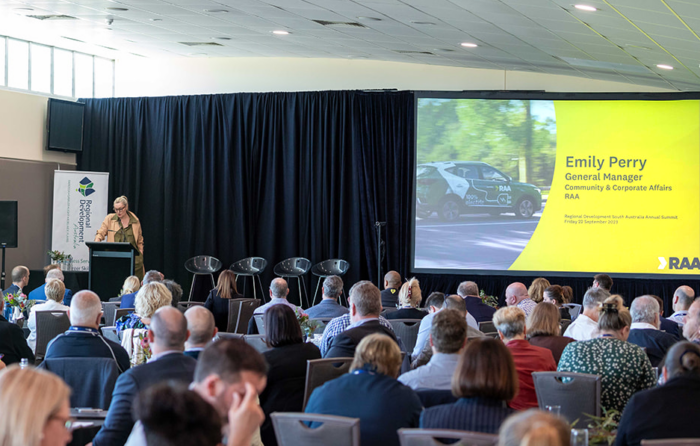
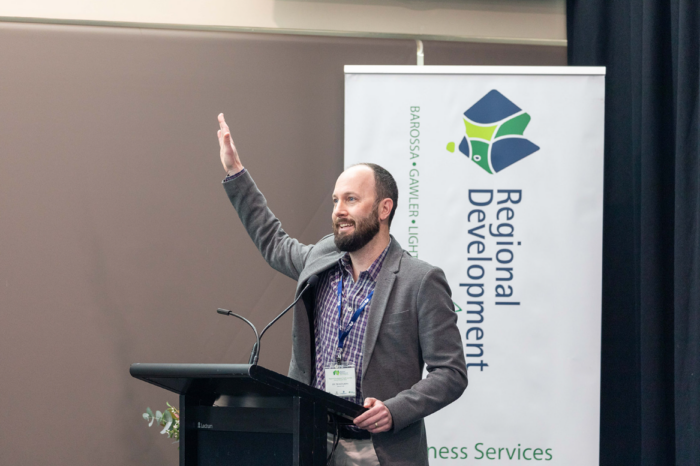
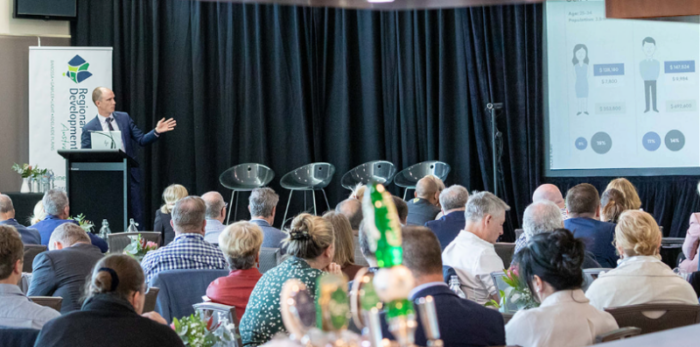
Keynote Speech: Population projection for regional SA – what is possible and how
Geoff Brailey – Demographer, trends analyst, social researcher and Lead Solution Designer at McCrindle Advisory
In Geoff Brailey’s insightful keynote address, the future of regional South Australia took centre stage, with a strong emphasis on forward-thinking strategies. The discussion revolved around six generations and seven pivotal factors shaping the regions, including population growth challenges, the evolving relationship between humanity and AI, and the imperative need for effective long-term strategies to harness future opportunities.
Geoff delved into the distinct mindsets and motivations of different generations, exploring their fears and hopes, revealing:
- Baby Boomers are concerned about retirement funds
- Gen X shared worries about financial stability and health issues
- Millennials (Gen Y) yearn for financial freedom and travel
- Gen Z desire homeownership but dread stagnant, unfulfilling jobs
We were also introduced to “Generation Alpha”, a term coined by Mark McCrindle for those born after 2010; a generation marked by higher education levels than any previous generation and global connectivity from birth. Statistics revealed that 1 in 2 Gen Z individuals hold a tertiary degree, compared to 1 in 4 in Gen X, highlighting increasing assess to higher education in younger generations. And while there may be a need to consider future jobs that may not yet exist, there still needs to be a focus on basics such as numeracy and literacy as well as financial literacy, digital literacy and cultural literacy.
Geoff outlined how our workforce is in flux, with Gen Z and Gen Y poised to dominate. The preference for remote and hybrid work models is gaining traction, particularly among Gen Z workers and peri-urban areas are emerging as promising hubs, offering the best of both worlds – city job access and a regional lifestyle. Adapting to evolving job markets is paramount, with a shift towards online learning, internships, and gig economy work.
As for the nation’s population, it’s on a trajectory to hit 40 million by 2050 from our current level of 26.5 million, which will require the construction of an additional 5 million homes, emphasising the dire need to unlock housing supply. This growth primarily hinges on migration, with 300,000+ people attributed to net overseas migration. Regional areas are now in the limelight, driven by factors like affordability, lifestyle, and the surge in remote work opportunities.
It’s important to recognise the communities the cultures that are going to be approaching you over the years and decades to come. This is a key part of preparing your effective communication and engagement with the changing face of Australia.
Geoff Brailey
South Australia faces the unique challenge and opportunity of an aging population, while cultural diversity is thriving. A striking revelation was that one in four Australians was born overseas, underlining the need for effective cross-cultural communication and understanding.
The 2021 Census also shed light on the health landscape for the first time, revealing that one in three Australians grapples with a long-term health condition, with mental health issues such as anxiety and depression spanning all generations.
Geoff’s speech reinforced the significance of future planning, demographic awareness, and strategies for attracting and retaining regional residents, and how by harnessing the potential of Generation Alpha, addressing housing demands, and celebrating our diverse society, South Australia will be better equipped to navigate an ever-evolving landscape.
How do we support population growth in South Australia
Emily Perry – General Manager Community and Corporate Affairs (RAA)
Emily shared insights into her organisation’s role in South Australia’s growth and the importance of collaboration between organisations, government bodies, and RDAs to tackle the challenges of population growth and infrastructure development.
She discussed RAA’s substantial investment in electric vehicle (EV) charging infrastructure, addressing the growing demand for EVs in the region. More than 500 charging points are planned, with 75% in regional areas to significantly enhance accessibility. Furthermore, RAA is branching into commercial solar installations, emphasising economic sustainability alongside environmental impact. This shift aligns with RAA’s goal of achieving a low-carbon future while addressing the issue of rising energy costs.
Emily stressed that growth should go hand-in-hand with infrastructure enhancement to maintain the region’s liveability, affirming RAA’s commitment to continued advocacy and infrastructure investments to facilitate South Australia’s regional growth objectives.
Innovation precincts and how they can benefit regional SA
Dr Tim Mahlberg – Director, SA Ecosystems Stone & Chalk
Stone and Chalk is a not-for-profit organisation funded by the Department for Industry, Innovation and Science with a mission to transform Australia into a sustainable tech-driven economy. Key to this is is supporting startups, with 57 currently under their wing leveraging cutting-edge tech to tackle diverse challenges. Since 2019 the startups supported by Stone & Chalk have collectively raised more $140 million in venture capital, generated more than 800 jobs in South Australia, and are currently valued at a quarter-billion dollars.
Dr Mahlberg emphasised the importance of inclusivity and diversity within the Innovation ecosystem, welcoming participants from various backgrounds, including government, corporates, universities, young innovators, and anyone else who was interested in connecting with people who think differently. The discussion also examined the qualities of founders and small business owners who embrace the qualities of risk-taking, resourcefulness, resilience, and relationship-building.
If you have innovators and rebels in your community they are my
favourite people.
Dr Tim Mahlberg
Micro-businesses and innovators from regional areas were invited to engage with Stone & Chalk for resources and community support. He urged government and regional hubs to explore partnerships, ultimately creating an extensive innovation network across South Australia.
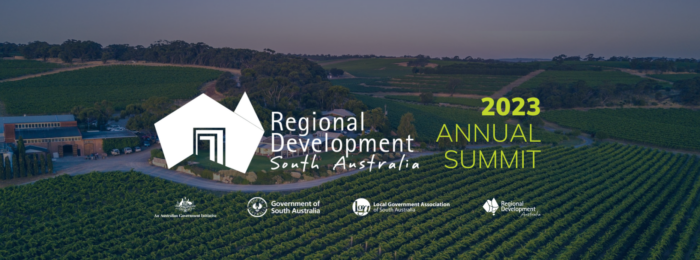
including photos, videos and speaker presentations.
